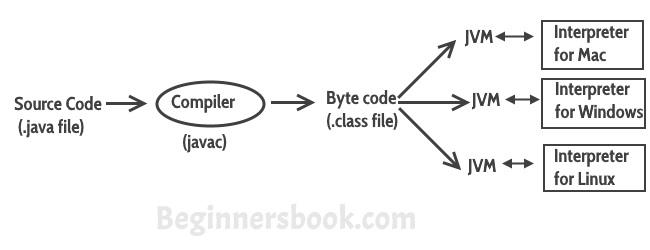Preview
Becuase of preparing the tech interview for my first job, I have to start review all points which might be asked. Firstly , JavaSE is the basic part of (java)web application development, thus I tend to go through the whole points at the beginning…
Java Terms
JVM vs JRE vs JDK
JVM is the virtual machine that runs on computers and executes Java byte code. The JVM doesn’t understand Java source code, that’s why we need to have
javaccompiler that compiles.javafiles to obtain.classfiles that contain the byte codes understood by the JVM. JVM makes java portable (write once, run anywhere).

- Java Virtual Machine : It’s an abstract machine . It is a specification that provides run-time environment in which java byte code can be executed. The primary function of JVM is to execute the byte code produced by compiler.
- Java Runtime Environment: it refers to a runtime environment in which java byte code can be executed. It implements the JVM and provides all the class libraries and other support files that JVM uses at runtime.When you have JRE installed on your system, you can run a java program however you won’t be able to compile it.When you only need to run a java program on your computer, you would only need JRE.
- Java Development Kit : It is the tool necessary to compile ,document and package Java programs. The JDK completely includes JRE which contains tools for Java programmers.The Java Development Kit is provided free of charge. Along with JRE, it includes an interpreter/loader, a compiler
javac, an archiverjar, a documentation generatorjavadocand other tools needed in Java development. In short, it contains JRE + development tools.
[WHY JAVA AS PLATEFORM INDEPENDENT LANGUAGE]
javacCompiler converts source code.java fileto the byte code.class file.As mention above , JVM executes the bytecode produced by compiler. This btyecode can run on any plateform(Windows,Linux, Mac OS etc).- Each operating system has different JVM, however the output they produce after execution of byte code is same across all operating system.
[EXPLIAN JAVA IS AN OBJECT ORIENTED LANGUAGE]
Object Oriented Programmingis a way of organizing programs as collection of objects, each of which represents an instance of a class.
- Abstraction
- Encapsulation
- Inheritance
- Polymorphism
Q:Why java is not 100% Object-oriented? Java is not 100% Object-oriented because it makes use of eight primitive datatypes such as boolean, byte, char, int, float, double, long, short which are not objects.
Pros of Java
Tips of Basic Part
1.Primary Data Type:Java supports eight primitive data types: byte, short,int, long,float,double,char,boolean.
The output of the relational operator is (true/false) boolean value, and in Java, true or false is a non-numeric value that is not related to zero or one.
2.Java string compare different case(uppercase & lowercase)
Rules of Declaring variables in Java:
- A variable name can consist of Capital letters A-Z, lowercase letters a-z, digits 0-9, and two special characters such as underscore and dollar Sign.
- The first character must be a letter.
- Blank spaces cannot be used in variable names.
- Java keywords cannot be used as variable names.
- Variable names are case-sensitive.
reference from:beginnersbook.com